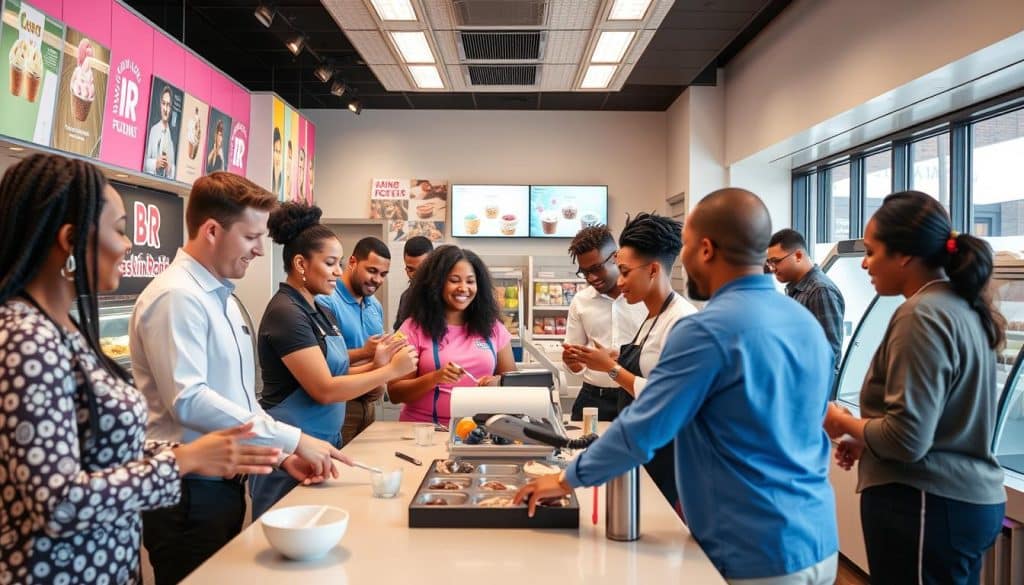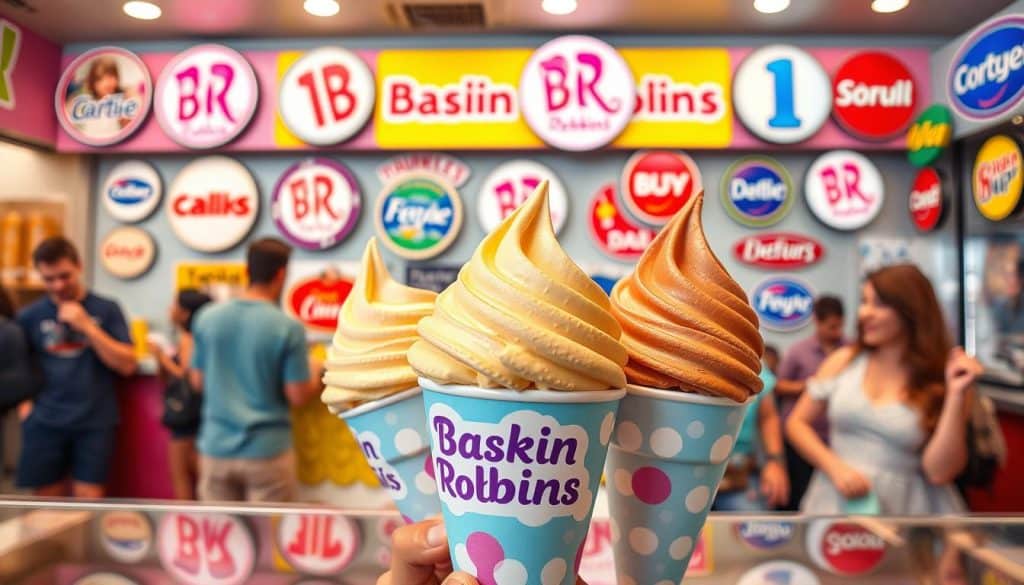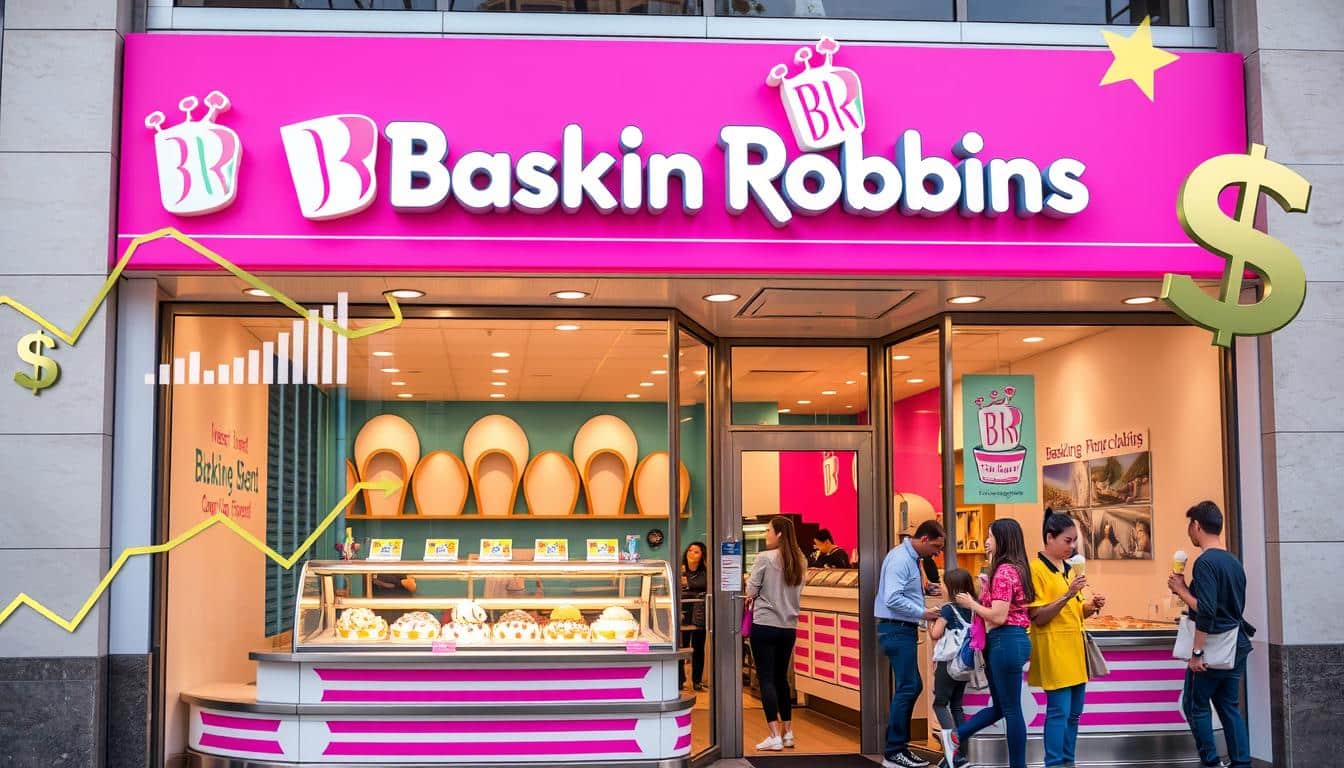Ever thought about owning a Baskin Robbins ice cream franchise? It’s more than just scooping ice cream. You need to understand the baskin robbins franchise cost, initial investments, and ongoing costs. With over 7,680 locations, knowing the baskin robbins franchise requirements is key.
This guide will cover the costs and investments for starting a Baskin Robbins franchise in 2024. You’ll learn about initial fees, estimated profit, and more. It’s all to help you decide if this brand fits your business goals.
Key Takeaways
- The initial franchise fee for Baskin Robbins is $25,000.
- Estimated total initial investment ranges from $307,440 to $657,860.
- Franchisees must have at least $100,000 in liquid assets and a net worth of at least $200,000.
- Ongoing royalty fees are set at 5.9% of gross sales.
- With over 7,500 units globally, Baskin Robbins is a significant player in the ice cream market.
- The profit margin for franchisees typically falls between 40% and 50%.
- The average expected return on investment (ROI) is between 18 to 24 months.
Overview of Baskin Robbins Franchise
Baskin Robbins is a big name in the ice cream world. It started in 1945 by Burt Baskin and Irv Robbins. The franchise offers baskin robbins franchise opportunities worldwide. It’s famous for its “31 flavors” and has over 1,400 unique ice cream flavors.
History and Background
Baskin Robbins grew fast, starting with six stores and reaching over 400 by the mid-1960s in the U.S. Now, it has more than 8,000 stores in about 52 countries. It serves over 300 million customers every year. The brand has introduced over 1,000 new flavors.
Brand Recognition and Market Presence
Baskin Robbins is part of Inspire Brands, which helps it grow. It’s a top global ice cream brand. In India, it has over 800 stores in more than 230 cities. The Indian ice cream market is expected to hit INR 508.4 billion by 2028.
Initial Franchise Costs
Starting a Baskin Robbins franchise requires understanding the financial commitment. The franchise fee is $25,000. This fee gives you access to the brand’s resources and market recognition. But, the baskin robbins franchise startup costs go beyond just the fee.
Franchise Fee Breakdown
Franchisees also need to consider initial investment for franchise costs. These include real estate development costs, ranging from $123,000 to $267,000. This covers setting up a location that meets brand standards. A good financial plan should include these costs to get a clear picture of total startup expenses.
Equipment and Supply Expenses
Equipment and supply costs are another big part of the total costs, ranging from $115,000 to $197,760. These costs cover the essential machinery and inventory needed for daily operations. It’s important for future franchise owners to carefully look at these baskin robbins franchise fees. This ensures they are financially ready for the initial phase of their business. The total estimated initial investment is between $307,440 and $657,860, covering all necessary expenses to start the franchise.
Ongoing Fees and Royalties
Running a Baskin Robbins franchise comes with ongoing fees. These fees are key for keeping the business running smoothly and marketing well. Franchisees must pay a 5.9% royalty fee on their weekly sales. These fees are vital for making the business profitable and sustainable in a competitive market.
Monthly Royalties Explained
The royalties are a big part of the financial commitment for franchisees. This fee helps fund brand initiatives. With over 7,500 locations globally, it’s important to understand these fees. They help keep the franchise visible and successful.
Advertising Contributions
Franchisees also pay a 5% advertising fee on their sales. This fee supports marketing efforts at both the national and local levels. It helps boost brand recognition and increase revenue. It’s important for franchisees to review these fees to make sure they fit their business plans.
For more details on the costs of owning a Baskin Robbins, check out Baskin Robbins franchise details.
Financial Projections and Profit Potencial
The financial outlook for Baskin Robbins franchisees is very promising. They can earn between $200,000 and $500,000 each year. This shows the franchise’s strong appeal in the frozen dessert market.
Franchise owners enjoy high profit margins, usually between 15% and 20%. These margins show the franchise’s solid financial performance.
Estimated Revenue for Franchisees
Those looking into Baskin Robbins should know top performers can earn more than average. Some make over $600,000 a year, thanks to busy locations or tourist spots.
Franchises in cities or malls do better than those in suburbs. Introducing new flavors can attract more customers and boost sales.
Factors Influencing Profitability
Several factors affect a Baskin Robbins franchise’s profits. The right location is key, as it can lead to higher earnings. Running the business efficiently and keeping costs low also helps.
Good marketing is another key factor. It can drive sales up. With these efforts, franchisees can see profits in 2 to 3 years.
Site Selection and Startup Costs
Finding the right spot is key for Baskin Robbins success. The best places have lots of foot traffic, good competition, and people who love ice cream. Doing a deep dive into site selection helps make smart choices that boost profits.
Ideal Location Characteristics
A spot that’s easy to see and get to draws in more customers. Places near schools, malls, or parks are great for Baskin Robbins. Knowing who lives nearby and what they like helps pick the best location.
Lease and Renovation Expenses
Lease deals can change a lot, affecting startup costs. Renovations must follow local rules and Baskin Robbins’ standards. Franchisees need to plan for these costs, which vary based on design and materials.
Getting help from Baskin Robbins on renovation costs makes opening smoother and more successful.
Training and Support for Franchisees
Starting as a Baskin Robbins franchisee means a lot of training. The first three weeks cover both classroom learning and practical experience. You’ll spend about 80 to 100 hours in class and 40 to 50 hours on-site. This costs $1,500, but it’s a great investment in your future.
Initial Training Program Overview
In the initial training, you’ll learn everything about running a Baskin Robbins. You’ll get to know the flavors and how to serve customers well. The program focuses on both skills and following the brand’s standards. This helps new owners feel ready to start their business.
Ongoing Support Resources
After the first training, Baskin Robbins keeps supporting you. They provide detailed manuals and marketing plans to boost sales and efficiency. There are also chances to keep learning and stay ahead in the market. Baskin Robbins is dedicated to helping you succeed, making it a strong partner in a changing industry.

Legal Considerations and Requirements
Knowing the legal needs for Baskin Robbins franchises is key for those interested. The Franchise Disclosure Document (FDD) is important. It shows the financial and legal duties of being a franchisee. Understanding these helps prepare for the responsibilities and navigate franchising well.
Franchise Disclosure Document (FDD)
The FDD has 23 parts that share important details about the franchise. It’s essential to understand the FDD significance. This document must be updated every year, as the FTC requires. Also, 14 states need specific FDD details for registration.
Reviewing the FDD carefully helps franchisees know their rights and duties. This knowledge is key to their business success. For more legal details, check out the Baskin Robbins franchise information.
Legal Fees and Obligations
Franchisees should know about legal costs for licenses and permits. These are important for following the rules and avoiding problems. Getting legal advice can help meet these requirements. This ensures franchisees follow all laws when opening their Baskin Robbins shops.
Comparing Baskin Robbins with Competitors
Baskin Robbins stands out in the ice cream franchise world. It’s famous for its wide range of flavors. The brand keeps innovating while listening to what customers want. This makes Baskin Robbins a strong competitor against Haagen-Dazs, Ben & Jerry’s, and Cold Stone Creamery.
Each brand adds to the lively ice cream franchise comparison. Unique selling points are key in this competition.
Unique Selling Propositions
Baskin Robbins shines with its many flavors and long history in ice cream. It has over 7,800 locations worldwide. This has built a loyal customer base that values innovation.
This loyalty helps Baskin Robbins stay strong against tough competitors. The brand also keeps up with market trends, staying appealing to customers.
Market Position Among Ice Cream Brands
Baskin Robbins’ global reach boosts its market position. A big part of its sales comes from places like South Korea and Japan. This international success gives it an advantage in the competitive ice cream market.
Understanding the ice cream franchise comparison is key for those thinking of joining. It shows the challenges and chances in this exciting industry.

Steps to Become a Baskin Robbins Franchisee
Becoming a Baskin Robbins franchisee is an exciting chance. It needs careful planning and thought. The journey begins with an initial inquiry. This is where interested people learn about the application process.
They fill out an application to show their interest. Then, they talk in detail with the franchise team. They need to understand the financial and operational expectations.
Initial Inquiry and Application Process
The application process is thorough and important. It makes sure the candidate fits well with the Baskin Robbins brand. Candidates should do a lot of research and market analysis.
This helps them understand the ice cream industry. They also learn about the brand’s products.
The Importance of Due Diligence
Doing due diligence is key for any franchisee. It involves checking financial commitments and reading franchise disclosure documents. It’s also important to talk to current franchise owners.
Knowing how Baskin Robbins works is vital. It shows the chances and challenges of keeping up with the brand’s standards. It also helps in building loyalty in a tough market.
Check our Blog for other franchise opportunities.





